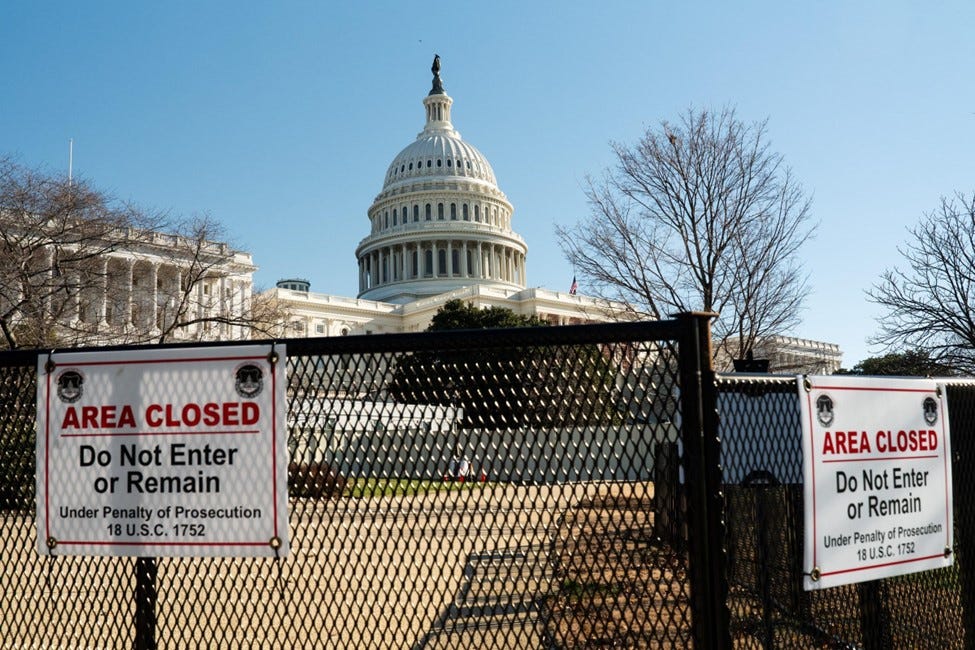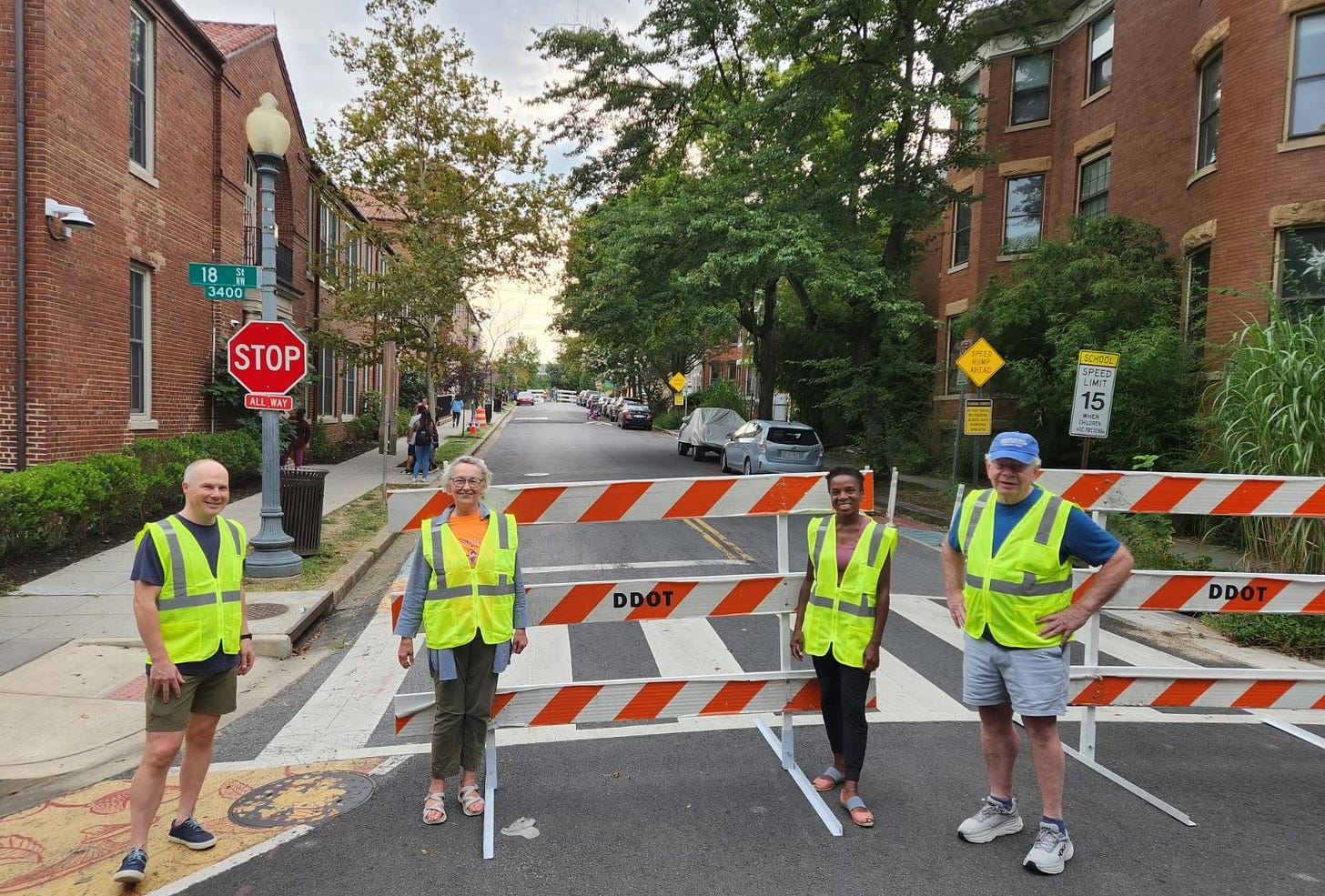
Hotels here in DC are sold out, and metal fencing has gone up around the Capitol. Trump will hold his victory rally downtown on Sunday and be sworn in Monday. There’ll be a protest, likely small. In 2017 I joined the Women’s March after the first Trump inauguration (on crutches, having fallen down my kitchen stairs two hours before). It felt important to perform our opposition before the country and the world. I don’t plan to march this year, though I wish the best to those who do. The mood among activists I know has shifted: we’re less performative, more deliberative than eight years ago.
That shouldn’t be confused with acceptance. Given the muting of street protests, a Guardian reporter jumped to conclusions:
Democrats have found the resistance movement that took off among liberals in the wake of his 2016 win no longer resonates in today’s political climate ... They have adopted a more conciliatory approach in confronting the incoming president’s agenda.
I don’t know who she talked to, but I don’t know a single person who’s feeling conciliatory. Many are angry. Invade Panama? Annex Canada? Stage an immigration raid in DC to make a big show? No one knows whether these are real threats or just bluster intended to distract and intimidate – to “flood the zone with shit,” in the words of Steve Bannon.
Still, there’s a grain of truth in the Guardian comment. Anand Giridharadas writes, “My strong sense is that a great many people who felt drafted into a resistance posture last time around do not feel so drafted this time. This does not mean they support Trump.” Rather, he says, people are wrestling with the question of what posture to adopt:
Some are retreating, focusing on the things they can control: digging into community, making art, reaching out to friends. Others are turning away from national politics and going local. Still others are jumping into the long-term work of rebuilding a pro-democracy movement that can win. And many are rethinking their priors, adopting a posture of curiosity instead of certainty.
Clearly we need to do all of these, though I wouldn’t use the word “retreating.” Nor do I agree that emphasizing the local means ignoring national politics. Quite the opposite: I believe that robust organizing at the local level is our path to success at the national level. Below are a few thoughts, resolutions if you will, that I’m keeping in mind as I try to figure out how to live and make a difference under Trump 2.0.
Rest and regroup
Giridharadas writes, “As the new year dawns, dread porn abounds.”
Like many people, I’m trying to limit doomscrolling. Some say they’ve stopped reading the news, but as a journalist’s daughter, I can’t do that. Bill and I continue to read both the New York Times and the Washington Post in print every day. I do limit the online newsletters and blogs I read regularly to under a dozen. And I’m pretty much off social media.
A pause is not the same as retreat. Turkish journalist Asli Aydintasbas, who lived through the rise of authoritarianism in Turkey, advises Trump critics: “Don’t panic. Don’t disengage. The answer to political defeat is not to disconnect, but to organize.” She reminds us that autocracy takes time to consolidate and that the United States’ decentralized system of governance provides resilience. Trump will overplay his hand, she says, and we need to be ready.

Connect locally
Digital organizing has made possible vast national outreach and collaboration. But as we’re finding out, it doesn’t substitute for the in-person contacts that lie at the heart of strong organizational ties. Writing in The Nation, Pete Davis describes the hollowing out of civic life nationwide, as entities with local chapters and members give way to impersonal, top-down operations. In the early 20th century, he says,
civic life was mostly based in mass-membership organizations – religious congregations, unions, fraternal organizations ... They were made up of local chapters that hosted in-person meetings, managed annual calendars of neighborhood events, fostered friendships between members, and contributed to the places where they were based. ... But American civic life started changing in the latter half of the 20th century. Mass communication became easier – and civic leaders fell in love with direct-mail fundraising campaigns. ... “Membership” no longer meant meeting up with one’s neighbors; it meant being on a list.
In other words: you send them a check, they send you a tote bag, followed by incessant demands for more donations. Commenting on Democratic Party outreach, Micah L. Sifry laments “digital organizing choices that have verticalized us into big lists that can be farmed for money or volunteer time instead of local, horizontal networks of people who know each other’s faces and concerns.” Meanwhile, MAGA world attracts followers through the evangelical churches, hyperlocal entities whose organizing power springs from intense, emotionally driven, face-to-face interactions.
I think about this every Friday afternoon as I stand guard outside our neighborhood elementary school, wearing my dorky reflective vest. Working in shifts, our volunteer team closes off the block in front of the school at pickup and dismissal times each day, keeping car traffic at bay. It’s cold out there on the barricades. But as I chat with my fellow volunteers, many of us older, and with young families heading home from school, I feel the warmth of a multigenerational, multiethnic community.
My crossing guard gig, organized through our neighborhood association, isn’t entirely disconnected from national politics. Last fall, conversations among volunteers often turned to the election and what we planned to do. Through that and other networks, I connected several friends with canvassing opportunities in Pennsylvania. In the days before the election, the canvass launch site in Harrisburg filled with volunteers from DC, at least a dozen of them from my neighborhood.
Then there’s my grassroots political group, NOPE. It started in 2017 with a dozen neighbors meeting around someone’s dining room table in Northwest DC. Today we reach 6,000 activists nationwide through email and Zoom. But core members continue to gather in person for potlucks, letter-writing parties, and carpools to out-of-state canvasses. There are similar groups around the country, some affiliated with networks like Indivisible and Swing Left, others freestanding, but most meeting in person at least some of the time. Personal relationships, grounded in mutual trust and care, are the root from which dynamic organizing can grow.

Engage the debate
That raises a difficult question, one that goes beyond the scope of this post: What exactly are we organizing for?
There aren’t easy answers. To defend democracy? Certainly, but that isn’t enough; a fair election can bring to power an autocratic figure like Trump. To elect Democrats? They’re better than the alternatives, though I don’t agree with Democratic candidates and office holders on every issue. At its top levels the party seems increasingly in thrall to ultra-wealthy donors, as is, of course, the GOP.
The drift of working-class voters away from Democrats last November is troubling. The Harris campaign leaned hard on Trump’s threats to democracy, but many voters cared less about that than about unaffordable food, gas, housing, and health care. Fairly or not, they saw Democrats as oblivious to their struggles. When I was canvassing in Harrisburg last October, voters sometimes asked me how Harris would help them. My answers fell short. One man responded, with a wry smile, “That’s all you got?”
We need to tell voters what our candidates would do to make their lives better. That means the party must come to grips with the root cause of voter anger, namely the decades-long restructuring of the economy to channel wealth upward. Rep. Chris Deluzio, a Democrat, held his seat in a Pennsylvania Rust Belt district last fall, running on a pro-union, anti-corporate platform. He says, “People are mad at the system. They’ve seen social mobility get worse.” Last fall voters across the country, including many in red states, passed ballot measures putting in place a $15 minimum wage, paid sick leave, and protections for the right to unionize. They told us what they wanted, even as the Harris campaign backed away from an economic populist message for fear of appearing too far left.
I hope the recent loss spurs Democratic Party decision-makers to rethink, and I hope that local organizers and volunteers will be part of that conversation. The party’s organizing model and messaging set the constraints within which we work, yet we have little voice in shaping them. Information almost never flows up. Pennsylvania’s Rep. Deluzio has little use for the election postmortems being churned out by professional consultants. Instead, he insists, “Talk to people who worked on the ground, union organizers, volunteers – talk to voters. That’s the most useful thing the party can do if it’s trying to understand what happened.”
It no longer makes sense to focus our outrage on Trump, the man. He can’t run again. And he’s surrounded by billionaires who are funding and driving the MAGA agenda for their own ends. It’s that agenda and its harms that we must resist. Trump is not going to meet his voters’ expectations for lower prices or anything else. When frustration builds again and another change election looms, will Democrats have something to offer?


I agree. We are not conciliatory nor retreating. Thanks for the overview. We Are Going to Keep on Moving Forward Never Turning Back as Holly Near reminded us many moons ago. Lots to keep us busy. We had a wonderful community meeting in Oberlin supporting immigrants and being educated about Rights. I felt a great sense of taking care of each other. We need to be here for one another and act. Onward!!!!
"Lewis Powell wrote a memo in 1971 that said basically, 'Capitalism free enterprise was under assault. And if we didn't as conservatives, business people, corporations didn't fight back, they would be subsumed.' Well, they fought back, Michael, and it has been one of the most successful and underreported fights over the last 50 years. They have created a conservative media ecosystem." - Eric Adelstein, Harris/Walz Media Consultant https://thegoldenmean2040.substack.com/p/a-new-presidency-a-new-political